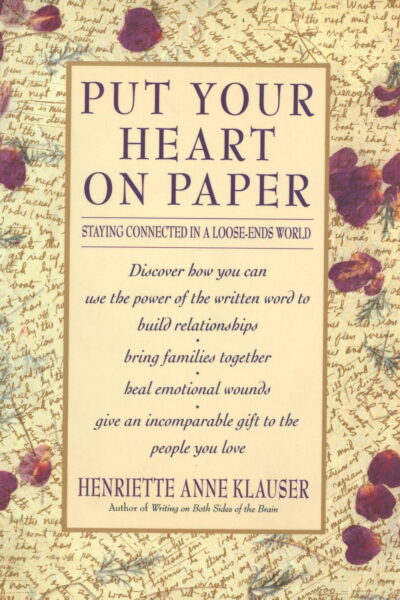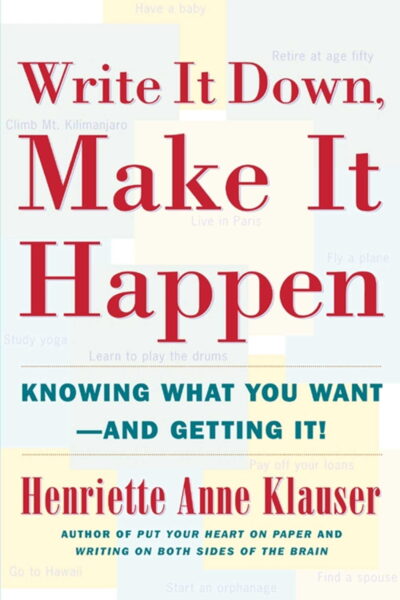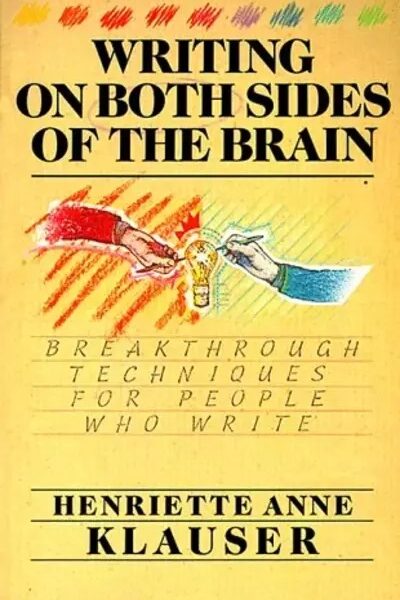Put Your Heart on Paper: Staying Connected in a Loose-Ends World
Put Your Heart On Paper is filled with the inspiring true stories of what happens when people write from their hearts: the shared insights, the new beginnings, the dreams that miraculously come true. In 50 provocative short chapters, acclaimed author Henriette Anne Klauser shows the power of the written word in everyday life.
The American Book of Living and Dying
For most people, the thought of dying or caring for a terminally ill friend or family member raises fears and questions as old as humanity: What is a “good death”? What appropriate preparations should be made? How do we best support our loved ones as life draws to its close? In this nondenominational handbook, Richard F. Groves and Henriette Anne Klauser provide comfort, direction, and hope.
With Pen in Hand
Why Writing Heals:
My friend Parker is fond of a passage in the Chronicles of Narnia. The magician’s nephew is on a winged horse in quest of the silver apple. Aslan tells him firmly that when he comes to the ice-mountain, he cannot fly over it; he has to go through it. That is the only way he will ever reach his true destination.
It is a truism of humanity. You cannot skirt the pain when your life is shattered by an event you never expected. You must go through the mountain, not around it, not over it, and confront the snarling beasts and demons.
Fortunately, you have a tool to defend you and protect you, like a magic shield, a tool you were given in grade school. You don’t even have to be good at it for it to work–and it is at your
Write It Down, Make It Happen: Knowing What You Want, and Getting It
Handling Breakdown
What if you write it down and it doesn’t happen?
The first thing to stop and consider is, maybe it did happen!
It just did not happen the way you intended. Go back and look at the outcome of the outcome, the benefit of the benefit of the benefit. What was it that you wanted out of that goal? You may have gotten what you wanted after all, from a different avenue.
My friend Charlie wanted to go to medical school. She wrote it down, described it in detail-and did not get in. Did she fail?
She wanted to go to medical school so she could become a doctor. She wanted to be a doctor so she could help people who were sick.
Charlie now works in a large city hospital as a physician’s assistant helping people with AIDS.
A friend of mine applied for a job he really wanted. He wrote on successive mornings how having that job would change his life.
He did not get the job.
“At first,” he told me, “I felt embarrassed to go back and reread the stuff about how much I wanted that position, then I realized that the message over and over, clear as a bell, was not the job itself, but what it represented to me: the ability to easily pay my son’s college tuition, to pay the mortgage on my house, to have the money to take a trip with my family–those were the biggies that kept coming up in my writing and to be satisfied in my work, and appreciated.
“I look back now and see I got everything I wanted, and some, in the position I did secure; in fact, it’s even better, because it’s closer to my house, and I like the company more. Until I realized that, I was still hung up on the fact that I did not get the first job.”
It wasn’t the job he coveted; it was the security and the money that he wanted, and the time to be with his family.
Jaimee wants to go to New York–she writes that down as the first outcome: the goal is to live and work in New York. As she continues to write, delving into the outcome of the outcome and beyond, she fills in the progression. The reason she wants to go to New York is to sing in a jazz club, and she wants to do that to feel fulfilled, to do what she knows she is good at, and therefore make a contribution to the world with her talents. Because of that, she can feel satisfied and happy when she goes to bed at night, and because of that, know in her heart for the rest of her life that she can dream big and have those dreams come true.
She writes down her goal, and a year later, she still has not gone to New York. But guess what she did do? She made a demo tape to circulate to local clubs in her home town, and started singing in jazz clubs there.
She has not given up her dream of going to New York, but in the meantime, she can still have the outcome of the outcome in her life.
Explore Other Avenues of Attainment
There are many roads to the mountain’s summit, but the view from the top is the same. When you focus on the outcome, you needn’t get discouraged. You just keeping asking, if not that, then what?
What else can I do to get the same end results? Humorist Marianna Nunes presents this useful formula for the “two steps forward, one step back” dance of life:
SW. SW. SW. NEXT!
When some step you take toward a goal does not have the expected result, rather than lose heart, make it your mantra:
Some will,
Some won’t,
So what?
Next!
Shift Brain Strengths
The right side of the brain traditionally governs the feeling, non-verbal part of you, while the left hemisphere handles rational thought and logic. When your goal is not working, determine which side you are operating from, and make a conscious shift to the other.
Get an emotional anchor if your practical side is running the show and running your dreams into the ground. Write about how it feels to achieve this goal; get passionate and expressive; attach an emotional connection.
Conversely, do something concrete if your feelings are running away with you. If your emotions (fear, doubt, worthlessness) are bringing you down, get practical. Think with your head instead of your heart. Educate yourself; get some brochures or books showing pictures of what you want looks like; talk to those who have done what you want to do; then write about some practical aspect of it to get grounded.
Shifting puts you back in charge and creates the balance to get you unstuck.
Steady On
Okay. You wrote about the perfect relationship, and you met someone who fit the description completely. Then it all fell apart. Is that a failure?
You didn’t get to go on the Caribbean cruise after all. Somebody else won the trip to Paris.
Try again.
Enter to win the contest again, or find another to enter. That is what Helen Hadsell would tell you. Helen wrote the book Name It and Claim It.
I like that title.
For Helen, Name It and Claim It refers specifically to contests. I would extend that title to encompass anything you write down to make happen. Name it, then claim it, is what writing it down to make it happen is all about.
Helen says, “There is no failure, only a delay in results.”
That’s one for those of you who like to hand-letter plaques or sew counted cross-stitch samplers, or photocopy pithy statements and put them above your computer or tucked into the corner of your mirror.
THERE IS NO FAILURE; ONLY A DELAY IN RESULTS.
Helen goes on to explain, “Don’t ever dismiss or nullify good, positive energy because you are disappointed. Acquire the attitude, ” . . . guess I need a little more patience.” It really does wonders for your peace of body, mind, and well-being.”
One of the tenets of neurolinguistic programming is that there is no such thing as failure, only feedback.
And patience is power.
Three Feet From the Gold
Napoleon Hill tells this memorable story in his classic, Think and Grow Rich.
A certain Mr. Darby had a gold mine in Colorado during the gold-rush days. It served him well for a short while, and then apparently dried up. He drilled a little further, dug a little deeper, but nothing. So he gave up, and sold the mining tools and the land to a prospector for a few hundred dollars. Within three feet of the place where Darby stopped drilling, the new owner tapped into a gold vein worth millions.
The incident changed Darby’s life. He never forgot his mistake in stopping only three feet from the gold. Years later, he said, “That experience was a blessing in disguise. It taught me to keep on keeping on, no matter how hard the going may be, a lesson I needed to learn before I could succeed in anything.”
“One of the most common causes of failure,” concludes Hill, “is the habit of quitting when one is overtaken by temporary defeat.”
Don’t stop three feet from the gold. Go back and dig some more.
Breakdown? Hooray!
I have some good news for you.
When everything is falling apart, it is a good sign that everything is about to come together.
In the very act of our birthing, we get a lesson for life. The ten minutes before delivery is often the hardest part of labor for mother and baby. It’s called “transition.” The mother is about to give up (too late!) while the father, who has read the birthing books and taken the La Maze classes, is ecstatic: he knows that, after the long period of labor, the baby is almost here.
Likewise in life, chaos often comes close to completion. When you recognize this pattern, you rejoice when everything breaks down; you must be getting close to the finish line.
When everything falls apart, I say, Hooray! We must be almost done. The computer crashes, the car’s transmission goes out–wow. Something BIG, really BIG is about to happen.
Push on. The breakdown heralds completion. You are three feet away from the gold.
And if you are headed in the right direction, all you need to do is keep on walking and keep on writing it down to make it happen.
Writing on Both Sides of the Brain: Breakthrough Techniques for People Who Write
Procrastination: Not Just Around, But Behind It
We’ve put it off long enough. It’s time to talk about procrastination.
Procrastination is an ugly, pejorative word. It is a stick to beat yourself with, a kick when you are down. Inherent in the word itself is a moral judgment. The judge and jury have already met. The verdict is passed. You are guilty without appeal.
The cruel irony of procrastination is that it becomes what it sets out to condemn. As soon as we start beating on ourselves for procrastinating, we find ourselves even more lacking in drive, even less motivated to do the writing that needs to be done.
Demoralizing, life-sapping words like should and ought and can’t start to reverberate in your head. You find what little energy you had draining away. And you promptly think of several more distractions to keep you from writing.
Procrastination paralyzes and then becomes a self-fulfilling prophecy.
Getting to the Root of It
Most advice about procrastination has a major drawback: it treats the symptoms, not the cause. Motivational tricks get you moving again; enticing reward act as a carrot on a string, but unless you figure out what made the writing mule balk in the first place, you will not go very far. Sure, you might get him going again, but if your have not figured out what he was afraid of, you do not know how to prevent it from happening further down the road. Soon the carrot trick does not work anymore.
I promised you I would change the nature of your relationship with writing permanently; in order to do that, you need to get behind the procrastination, not just around it, and find out what is causing it in the first place. Treat the cause and not the symptoms.
Resistance Has Meaning
I am always leery of absolutes. Myself, I never use them. Like Jane Austen’s Edmund Bertram of Mansfield Park, “I trust that absolutes have gradations.” Yet there is one absolute I will always stand behind. Resistance always has meaning. When you find yourself reluctant to act, your body and your mind are trying to tell you something.
When you delve into the meaning behind whatever it is that you are resisting, you will discover that there are choices underlying the work stoppage, a payoff that makes not writing somehow more attractive than writing. You may be resisting completing a certain writing project because you don’t want to face having your boss tear it apart.
Fighting Resistance Never Works
A funny thing happens when you fight resistance. It gets worse.
Do not fight procrastination. When you get into a power struggle, you often lose. Either you become either more paralyzed, or if you force yourself to write, in spite of a negative energy pushing you in the opposite direction, chances are you will produce turgid, plowing prose that is awful to read, certainly not your best work. When you write with your teeth gritted, what you write grits the teeth of your reader.
On the other hand, if you acknowledge procrastination, you do not need to dramatize it. It is not just a noticing, it is a letting go.
Rather than opposing force with force, overcome it by yielding. Move toward the procrastination, move with it. What does it have to tell you?
Perhaps you are starting to see that procrastination is not an outside force and you are not a helpless victim. Procrastination comes from resistance inside, and you can make choices. You are in charge. You can take command of the situation, move forward, and write. In the rest of this chapter, we will look at specific ways to get at the meaning behind your own procrastination.
When you are no longer encumbered by the psychological drain of procrastination, you will be free to do your best and most fluent writing ever.
Copyright © Henriette Anne Klauser, 1987. All rights reserved. No part of this excerpt may be reproduced, stored in a retrieval system, or transmitted, in any form or by any means, electronic, mechanical, photocopying, recording, or otherwise, without the prior written permission of the publisher. Printed in the United States of America.







